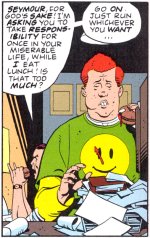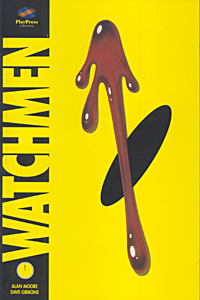 Welcome to the final installment of CHUD.com’s exclusive interview with Paul Greengrass, the director of Watchmen (if you missed parts 1 and 2, catch up on them now! Part 1 – click here. Part 2 – click here). If there’s anything you’ve learned from the past two installments it’s that Paul is one passionate filmmaker, and he loves to talk Watchmen.
Welcome to the final installment of CHUD.com’s exclusive interview with Paul Greengrass, the director of Watchmen (if you missed parts 1 and 2, catch up on them now! Part 1 – click here. Part 2 – click here). If there’s anything you’ve learned from the past two installments it’s that Paul is one passionate filmmaker, and he loves to talk Watchmen.
As we wrapped up our epic phone conversation, Paul tied the upcoming film into his two previous movies, and he offers some startling insights on what he plans to do – and how it might very well end up working. It’s not terribly journalistic of me, but at the end of all this I ended up believing that if anyone can make Watchmen work as a movie, it’s going to be Paul Greengrass. Be sure to let us know how you feel by posting on our message boards, and check out the brand new Watchmen message boards, where Paul has been paying attention to what the fans say.
Q: Is the world ready for a very serious superhero movie like this?
Greengrass: It’s interesting that you say that. I have made many, many films over the years that have been tiny. Frankly that were made for the amount of money that will be our catering budget. I loved every single one of them. I didn’t intend to make films in Hollywood. It wasn’t part of my plan. It happened by accident because I made a film called Bloody Sunday and people liked it. I got offered The Bourne Supremacy and I had liked The Bourne Identity, because I thought it was quite a fresh, interesting collision of a kind of mainstream Hollywood thriller with an indie spirit that Doug Liman brought to it. Out of that collision something interesting got made because I went to the cinema and watched that and enjoyed it and thought it was something fresh and new.
When they said they had liked Bloody Sunday and wanted to know if I was interested in Bourne Supremacy I was very interested, and the reasons for that were a number. First and most importantly I thought what was most interesting about The Bourne Identity is that it existed in a world that I understood, a world of us and them. Where they were doing things that we didn’t understand and we were trying to run away from or find out what they were doing. And yes, it was expressed as a kind of thriller full of action, but essentially the underpinning of the story was a world that I recognized, a real world. In particular what interested me was – this is the Brit in me coming out – you have in the market place prior to Bourne Identity the James Bond films.
Personally, as a Brit and as a sentient person having made the kinds of films I’ve done and 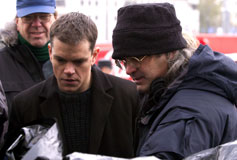 having done the things I’ve done over the past twenty five years, I find the value system offered by James Bond – while I enjoy those films, I’ve seen them all – the value system I don’t accept. Why? Because James Bond is an insider. He’s a secret agent and he loves it. He’s quite a cool character. He kills people without compunction. That’s part of the appeal. He’s a misogynist. He works for them against us as part of some secret game we’re never privy to. To my mind as a Brit, the whole bow tie at the Monte Carlo casino, looking at the girl with the big breasts, that stuff is just not where I am. As a series of values they’re not ones I share.
having done the things I’ve done over the past twenty five years, I find the value system offered by James Bond – while I enjoy those films, I’ve seen them all – the value system I don’t accept. Why? Because James Bond is an insider. He’s a secret agent and he loves it. He’s quite a cool character. He kills people without compunction. That’s part of the appeal. He’s a misogynist. He works for them against us as part of some secret game we’re never privy to. To my mind as a Brit, the whole bow tie at the Monte Carlo casino, looking at the girl with the big breasts, that stuff is just not where I am. As a series of values they’re not ones I share.
Jason Bourne seemed to me to offer the precise reverse. He was a secret agent who was on the run. He was on the outside, running, trying to find out what they were doing. There was not a trace of misogyny. Here was a guy moving towards the light. He wanted to be free of all that shit.
Q: I love the fact that your whole film is about Jason Bourne trying to apologize.
Greengrass: Exactly! What we could do with that second film was enrich and deepen the character of Jason Bourne and make him iconic and speak to the zeitgeist. The Bourne Identity was made when it was made [pre-9/11], but The Bourne Supremacy came the other of our understanding that we had a war and many of us were not happy about it and in particular there were these great crises of whether or not we had been told the truth.
What you had injected into the culture was this vast amount of lies and deceit that swirled about and made us all doubt what we were being told. It was like, Can we trust them, are they telling us the truth? Are they telling us the truth about really big, important things like why we went to war. Making this commercial thriller about this guy who was on the run from them spoke to that. I do believe that that was the principal why that film really worked. There were other things that was just as important – Matt, who incidentally shared that vision, was the perfect person to play the part because of his understatement and his identification with the us against them, if you like. Also I tried to make it as a ride. I thought there’s a lot of dark material. The Bourne Supremacy is a very dark film, if you look at it in the abstract. The story is about a government assassin who is on the run, people are trying to kill him, he has to kill to survive, he’s remembering having to kill this woman, shooting her in the head in her hotel room in Moscow all those years ago, and he ends up on this weird, bizarre pilgrimage to say sorry to a young woman? That’s not an easy story to tell, but by telling it with character at the forefront and trying to create the world on the move – that’s what I wanted to do. Let’s get behind Bourne’s shoulder while he’s on the run and really take that experience so you feel it like a live experience. What it did was make challenging material accessible to a mainstream audience.
That is another thing that I hope – I believe and hope – that I will be able to do with Watchmen. To be able to take this dense, difficult, challenging, magnificent and complex material and render it as a vision of the world on the move. So that it’s filled with – I want you to feel that you are in Watchmen World and it’s live. You are experiencing it over their shoulders. I think that will make a compelling watch, and that’s why I believe in this film as a mainstream film. I don’t want to make an art film of Watchmen. I think that would be doing the material a tremendous disservice. I do believe this material speaks to us today, to a big audience. Of course to the audience who knows Watchmen, but also to the audience who may have heard but don’t really know and also to that huge audience who I want to touch who have never heard but who will come to discover. I think that requires filmmaking of 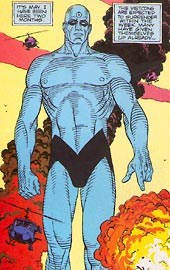 passion and movement.
passion and movement.
I don’t mean lazy movement. I’ve never been a believer in throwing the camera around for no reason. But I do believe in the drama of being with character.
Q: Your films are definitely kinetic.
Greengrass: Certainly. That’s what I believe my Watchmen will be. It will be kinetic. That’s where Threads comes in.
Q: You know, you talked about James Bond before. Have you heard about the new James Bond film?
Greengrass: No I haven’t.
Q: You and the Bourne films have obviously inspired them, because the new Bond film is going to be a version of Casino Royale with a young Bond just starting out, getting his bearing as a spy.
Greengrass: That’s a good thing! I’m not knocking them. There have been some truly magnificent and fun James Bond films. There have been some that were really, really poor. The novels, if you read those early Fleming novels, they’re remarkable pieces of amoral literature, in truth.
That was then, this is now. If you’re a filmmaker interested in the world, as I am, you have to find material that speaks to the world as it is today. If they’re trying to do that it’s not because of me, it’s because the audience that goes to theaters, I think, is tired of being patronized. They want to see movies that speak to them and reflect the world as they see it. Of course they want to be entertained. Nobody wants to turn up on Saturday night and have an academic lecture or a political speech. That’s not why you go to the movies. You go to the movies to be entertained, to be moved, and to be offered a complex collision of elements that only cinema can give you. And that’s why Watchmen is such a magnificent basis for a film today. It’s the absolute collision of so many different elements. Just think of what they are:
You’ve got the footsteps to Armageddon, a terrifying, compelling journey. You’ve got the classic murder mystery. You’ve got a love story. You’ve got generational issues. It’s everything. You’ve got a piece that speaks back, as you said, to the whole tradition of comic book storytelling. But it’s not just any one of those elements, it’s the collision of all of them.
Q: One of the things I loved about Bourne Supremacy is how it utilized so many practical effects, how so much of it was done in camera. Watchmen is a bigger and more fantastical story – are you going to try to keep it based on practical effects?
Greengrass: Yes is the answer to that. One of the things I like about Watchmen is that it’s not lazy in its use of those things. There’s not so much gizmo-ing, if you know what I mean. It’s not really about that. Yes, you have some absolutely magnificent feats of storytelling. Shifting to Mars, shifting to Antartica. The vision of Armageddon itself. They’re the boldest leaps, but there very rarely are cheap tricks.
That’s one of the reasons again why I felt I could do this film. One of the things we did in Bourne Supremacy was try to eradicate any hint – one of the things that distinguishes James Bond from Jason Bourne is that James Bond worships at the altar of technology. He’s got a car where guns come out of the hood and it can elevate this way and a special pen that can turn into this – it’s all gizmo technology cheap thrill storytelling.
Q: And Jason Bourne has a magazine and a toaster.
Greengrass: Exactly. I think that one of the ways to express the Watchmen world is to do that. These characters are real characters in Watchmen world. They are not make-believe characters. You have to believe, you are led to believe, by the power and detail of the storytelling that this is the way the world unfolded.
That’s why One Flew Over the Cuckoo’s Nest and Diane Arbus are very interesting ways of understanding it. You look at the Arbus photographs of circus folk or whatever – you are entering a private world that exists in our world. It’s not our world, but it’s in our world. It speaks to us and yet its mores and its wardrobe and its behaviour is totally different. But 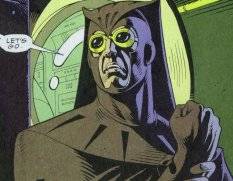 there is within its differentness, its seperateness, a type of heroism. A quality of compassion. A degree of humanity. There is more and yet its’ the same as we see in our world. It’s the same with Cuckoo’s Nest.
there is within its differentness, its seperateness, a type of heroism. A quality of compassion. A degree of humanity. There is more and yet its’ the same as we see in our world. It’s the same with Cuckoo’s Nest.
That is one of the things, incidentally, if we cast this film right, with the right actors as I believe we will, we will be able to convey as those actors in Cuckoo’s Nest conveyed that so magnificently.
Q: I have to say that talking to you has gone a long way to making me a believer.
Greengrass: Suspend all your belief until the end. What I want to convey is that I want to enter dialogue, and I want people to judge when the time has come. That’s all I ask. You can’t expect people to say, “Paul Greengrass is making a film and it’s going to be great because he did Bloody Sunday and Bourne Supremacy is quite a good film.” We can fuck this thing up. Of course we could. You never know. It’s like cooking. It’s like any human endeavor. You have to set out with some vision, with passion for the material, with humility and with a listening ear. And you have to start. That’s what you have to do, start and say you believe you can do this and carry the community and reach a big new audience. If I didn’t believe that I wouldn’t start. All I ask is to be judged when the time is there. As I know I will be!
Q: I have to tell you on the record that I was doing research for this and I watched Bloody Sunday and it made me just weep. Bourne Supremacy is what I think people are looking at to figure out what you’ll bring to Watchmen, but I think it’s the humanity that’s in Bloody Sunday that’s so touching that will be important here.
Greengrass: Every film you make you bring the last one to it and the one before. You are who you were and you try to be who you want to be as a filmmaker. I think that on Watchmen I will be drawing on both those things.
I am proud of The Bourne Supremacy being not like the average mainstream thriller but yet it really worked in the mainstream. I’m proud of that. I’ve made films in the arthouse and I have loved every single one of them but I really enjoyed reaching a bigger audience with authenticity. What I want to do with Watchmen is marry the two, if you like. To take the uncompromising nature of trying to make a film about Bloody Sunday where you have certain truths that couldn’t be ducked, certain things that had to be there. But yet that was an exciting film and I want to marry it with the ability to craft a powerful mainstream film. I think that’s what Watchmen allows me to do.
And here are many great dramatic sequences in Watchmen the comic, but two of the greatest and most sustained are the two Mars sequences. One where he’s on his own, and one where he’s with Laurie. They’re powerful and profound discourses.
Q: And they’re very relevant. Today it’s easier to understand what it’s like to be inundated with information and humanity. It’s easier to understand where he’s coming from in this very wired world, as opposed to 20 years ago.
Greengrass: I totally agree with you there, and it goes to what I was saying at the beginning of our conversation that in many ways we live more in Dr. Manhattan’s world today than we did in 1987. One of the things that Watchmen the film will do, I think, will 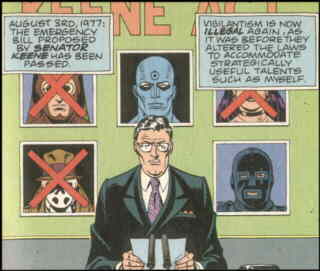 try to explore that. Without losing any of the other story elements.
try to explore that. Without losing any of the other story elements.
And of course, interesting also in a different way, is Adrian. That great staring at the screen trying to divine the future of the world just by trying to assimilate the information it throws at you is absolutely prophetic. For Alan Moore to write that in 1987 is extraordinary. When you think how that is now part of the texture of our lives today. That was written prior to the net. That feeling now that you can hear the way the world’s going by listening to its Babel incantations – prophecy of the high order.
Q: The other interesting thing with the modern world and Watchmen is that the war in Iraq parallels what Adrian’s plan is, where we’re being told that this horrible, violent and wrong thing has to happen to make the world a better place. It’s being done for bigger and better reasons.
Greengrass: I can’t agree more. I think the tension between Dr. Manhattan and Adrian in the story is at the heart of what I am interested in doing and exploring. I think the story – the film, the movie, the experience – that’s going to be the heart of it. On top of it is the murder mystery and Rorschach trying to find out his thing and Dreiberg doing his thing, They’re the narrative drivers, in the graphic novel and the film. But what lies at the back of it is this pitting of Manhattan and Adrian and they’re pitted in different views of how you use power. That debate is one that is defining our world at the moment. And will continue to do so in our dangerous world of nuclear proliferation. The genius of Alan Moore was to understand that although the world was seemingly frozen in bi-polar mode it was actually in the process of changing and moving us to Armageddon, and it was going to happen without us being able to stop it. That was, again, prophetic of him, but we are in that world now. That is what is happening now, in front of us. Nobody pretends it is easy to deal with a world where North Korea and Iran are developing these weapons. Whatever our views on our world and the way my government and your government have dealt with these situations, no one can pretend that it’s easy. There are real problems about how you deal with this stuff. And that’s what makes Watchmen so interesting. This is real. This is going to be compelling in the same way Bourne was.
I used to say this about Bourne but I think it’s the same for Watchmen. If you’re a movie going person as I am, if you see lots of movies and love going to the movies, you see a lot of films that are entertaining and take you to fantasy worlds. They’re great and I love them too. I love taking my kids to them. But now and again on a Saturday night you want a film that gives you all that power, excitement, the best ride in the fair type experience, yet you see it and realize it’s set in the real world. When it comes along once or twice in the summer, as Bourne did, you seem special and different. And you are special and different because you’ve taken that bold risk to give the best ride in the fair but in the world people know. I think that’s what we’ll do with Watchmen. It’ll have the shock of the new.
